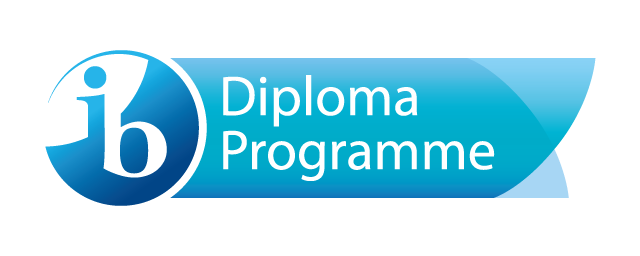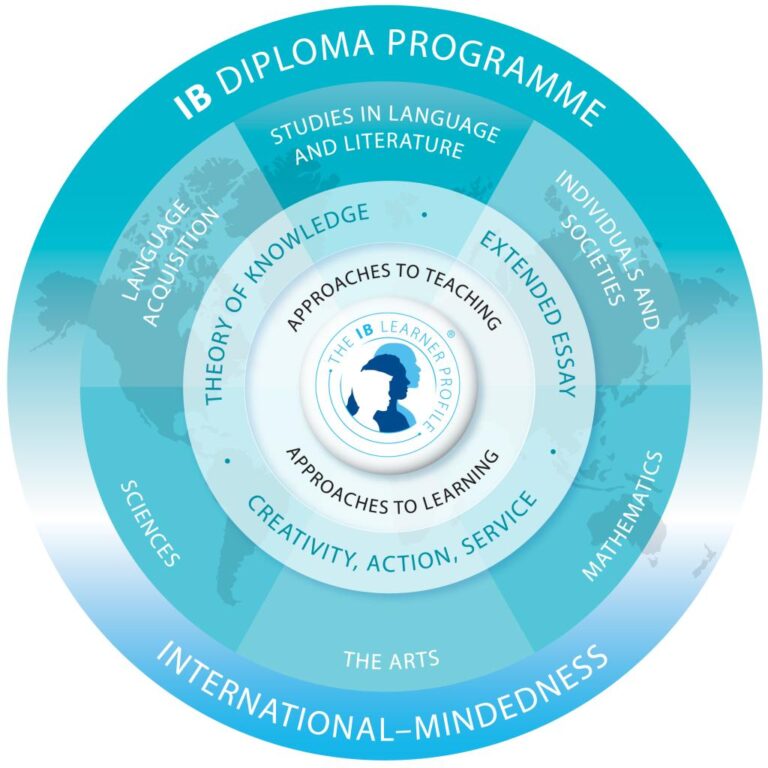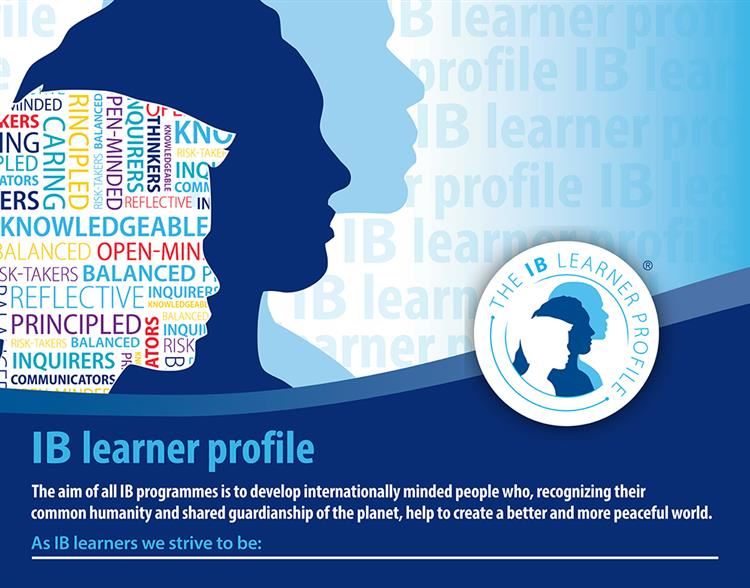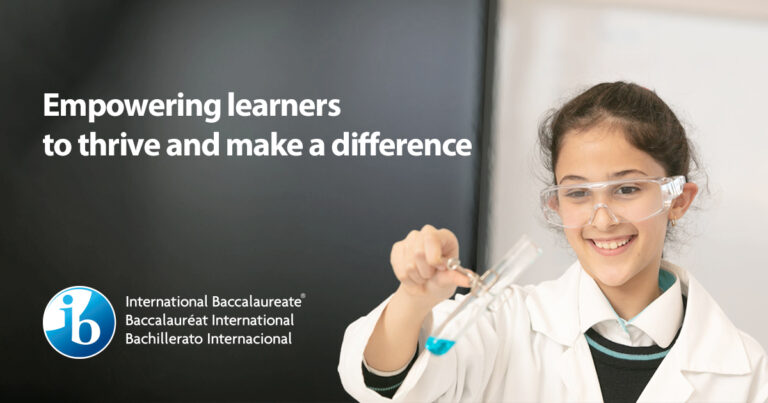International Baccalaureate Diploma Program
Overview of International Baccalaureate Diploma Program
International Baccalaureate (IB) Diploma Programme (DP)
The International Baccalaureate® (IB) Diploma Programme (DP) is an assessed programme for students aged 16 to 19. In Ontario DP spans across Grade 11 (Year 6) and 12 (Year 7). The IB DP is recognized by leading universities around the world.
The IB DP curriculum is made up of six subject groups and the DP core. The DP Core is made up of three required components, which aim to broaden students’ educational experience and challenge them to apply their knowledge and skills.
IB DP Core Components
Through the Diploma Programme (DP) core, students reflect on the nature of knowledge, complete independent research and undertake a project that often involves community service. The three core components are:
- Theory of knowledge: Students reflect on the nature of knowledge and on how we know what we claim to know.
- The extended essay: An independent, self-directed piece of research, culminating with a 4,000-word paper.
- Creativity, activity, service: Students undertake and engage in activities related to each of the three strands.
IB DP Subject Groups
- Studies in Language and Literature
- Language A: literature
- Language A: language and literature
- Literature and performance*
2. Language acquisition
- Classical Languages
- Language Ab initio
- Language B
3. Individuals and societies
- Business management
- Digital society
- Economics
- Geography
- Global politics
- History
- Language and culture*
- Philosophy
- Psychology
- Social and cultural anthropology
- World religions
4. Sciences
- Biology
- Chemistry
- Computer science
- Design technology
- Environmental systems and societies*
- Physics
- Sports, exercise and health science
5. Mathematics
- Analysis and approaches
- Applications and interpretation
6. Arts
- Dance
- Film
- Music
- Theatre
- Visual arts
* Interdisciplinary subjects are marked with an asterisk. Interdisciplinary subjects enable students to meet the IB diploma requirements for two groups, whilst studying one subject. Students then select another subject to complete the requirement of six.
International Baccalaureate (IB) Diploma Programme (DP) Subject Groups
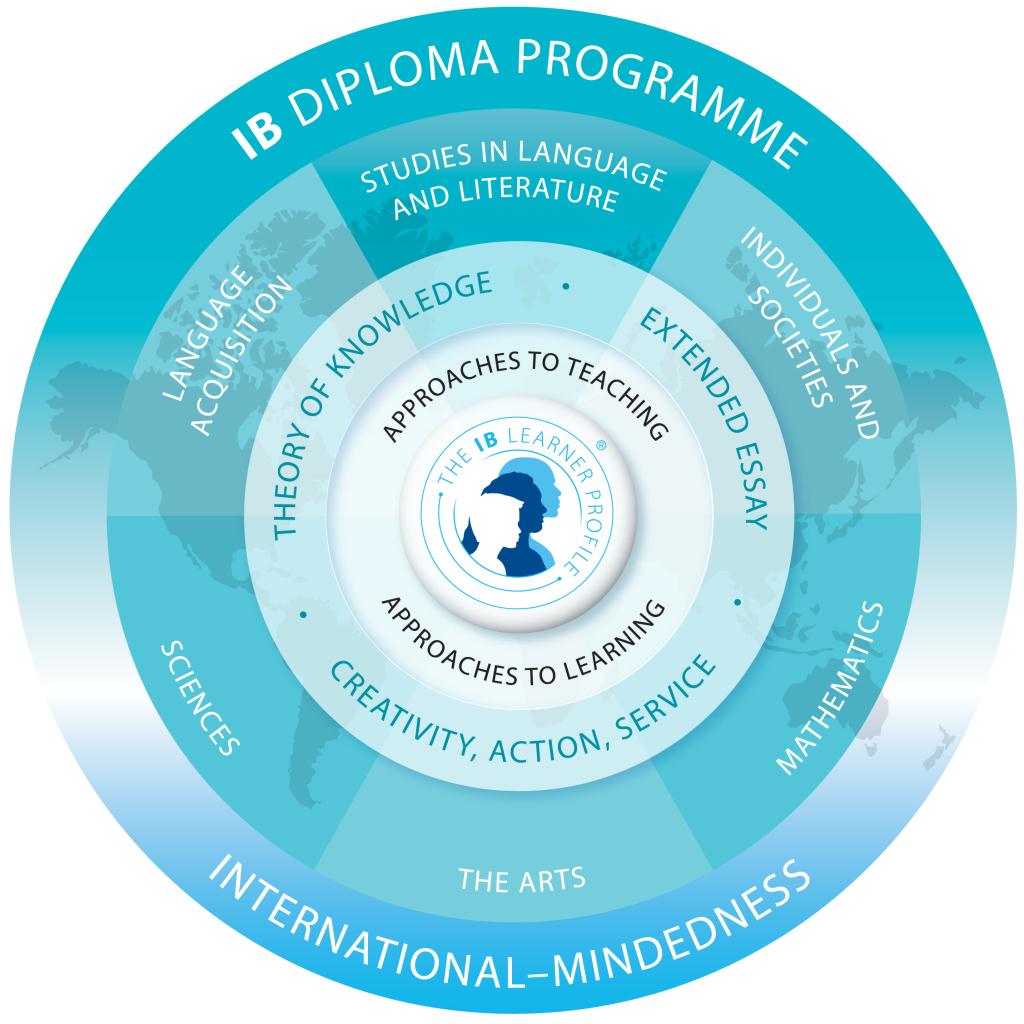
Language acquisition
- Classical Languages (SL or HL)
- The Diploma Programme course in classical languages provides opportunities for students to explore the languages, literatures and cultures of ancient Rome and Greece. The course is designed to enable students to study classical languages in higher education, and also welcome those students who seek to develop an awareness and appreciation of the different perspectives of peoples from classical cultures through the study of texts in the original language.Latin and Classical Greek are separate subjects in DP classical languages. They share the same syllabus outline and assessment model, and can be studied at standard level (SL) or higher level (HL). For a given language, SL and HL syllabus requirements share elements, including authors and options, as prescribed in the guide. The difference between SL and HL is reflected both in the breadth of study and in the level of knowledge and skills expected at assessment.
- Language Ab initio (SL)
- Students develop the ability to communicate in the target language through the study of language, themes and texts. In doing so, they also develop conceptual understandings of how language works. Communication is evidenced through receptive, productive and interactive skills across a range of contexts and purposes that are appropriate to the level of the course.The language ab initio syllabus is organized into five prescribed themes: identities, experiences, human ingenuity, social organization and sharing the planet. The language ab initio syllabus prescribes four topics for each of the five prescribed themes for a total of 20 topics that must be addressed in the language ab initio course.
- Language B (SL or HL)
- The distinction between language B SL and HL can been seen in the number of recommended teaching hours, the level of competency the student is expected to develop in receptive, productive and interactive skills, and that HL students are required to study two literary works originally written in the target language.Students develop the ability to communicate in the target language through the study of language, themes and texts. In doing so, they also develop conceptual understandings of how language works. Communication is evidenced through receptive, productive and interactive skills across a range of contexts and purposes that are appropriate to the level of the course (and beyond those for language ab initio).The language B syllabus is organized into five prescribed themes: identities, experiences, human ingenuity, social organization and sharing the planet. Optional recommended topics and possible questions for each theme are presented in the guide, but are not prescribed.
Studies in Language and Literature
- Language A: literature (SL or HL)
- The language A: literature course introduces students to the analysis of literary texts. It is the course through which the IB’s policy of mother-tongue entitlement is delivered. The course is automatically available in 55 languages and available by special request and may be studied in any language with a sufficiently developed written literature.The course is organized into three areas of exploration and seven central concepts, and focuses on the study of literary works. Together, the three areas of exploration of the course add up to a comprehensive exploration of literature from a variety of cultures, literary forms and periods. Students learn to appreciate the artistry of literature, and develop the ability to reflect critically on their reading, presenting literary analysis powerfully through both oral and written communication.
- Language A: language and literature (SL or HL)
- The language A: language and literature course introduces the critical study and interpretation of written and spoken texts from a wide range of literary forms and non literary text-types. The formal analysis of texts is supplemented by awareness that meaning is not fixed but can change in respect to contexts of production and consumption. This course is available for study in 17 languages.The course is organized into three areas of exploration and seven central concepts, and focuses on the study of both literary or non-literary texts. Together, the three areas of exploration of the course allow the student to explore the language A in question through its cultural development and use, its media forms and functions, and its literature. Students develop skills of literary and textual analysis, and also the ability to present their ideas effectively. A key aim is the development of critical literacy.
- Literature and performance (SL)
- The literature and performance course aims to explore the relationship between literature and theatre. The main focus of the course is the interaction between the literary skills of close reading, critical writing and discussion and the practical, aesthetic and symbolic elements of performance.The course is organized into three parts, each focussed on a different aspect of literature and performance. Together, the three parts of the course cover the critical study of literary texts, the exploration of chosen approaches to a text, and the realization of texts in performance. Students engage with a wide variety of textual genres to explore the concept of transformation, examining the ways in which the contexts of production and reception shape meaning.
Individuals and societies
- Business management
- Digital society
- Economics
- Geography
- Global politics
- History
- Language and culture
- Philosophy
- Psychology
- Social and cultural anthropology
- World religions
Sciences
- Biology (SL or HL)
- Through studying a science subject students should become aware of how scientists work and communicate with each other. While the scientific method may take on a wide variety of forms, the emphasis on a practical approach. In addition, through the overarching theme of the “Nature of Science” this knowledge and skills will be put into the context of way science and scientists work in the 21st century and the ethical debates and limitations of creative scientific endeavour.
- Chemistry (SL or HL)
- Chemistry is an experimental science that combines academic study with the acquisition of practical and investigational skills.It is often called the central science as chemical principles underpin both the physical environment in which we live and all biological systems. Apart from being a subject worthy of study in its own right, chemistry is often a prerequisite for many other courses in higher education, such as medicine, biological science and environmental science.
- Computer science (SL or HL)
- Computer science previously formed a subject in group 5 of the Diploma Programme curriculum but now lies within group 4. As such, it is regarded as a science, alongside biology, chemistry, design technology, physics, environmental systems and societies and sports, exercise and health science.
- Design technology (SL or HL)
- DP design technology aims to develop internationally-minded people whose enhanced understanding of design and the technological world can facilitate our shared guardianship of the planet and create a better world.
- Environmental systems and societies (SL or HL)
- Through studying environmental systems and societies (ES&S) students will be provided with a coherent perspective of the interrelationships between environmental systems and societies; one that enables them to adopt an informed personal response to the wide range of pressing environmental issues that they will inevitably come to face.
- Physics (SL or HL)
- Physics is the most fundamental of the experimental sciences, as it seeks to explain the universe itself from the very smallest particles to the vast distances between galaxies.
- Sports, exercise and health science (SL or HL)
- The Sports course lies within the Sciences. Students explore the concepts, theories, models and techniques that underpin each subject area and through these develop their understanding of the scientific method.SEHS students participate in a compulsory group 4 project. This collaborative and interdisciplinary exercise provides an opportunity for students to explore scientific solutions to global questions.
Mathematics
Students can only study one course in mathematics as part of their diploma.
- Analysis and approaches (SL or HL)
- The IB DP Mathematics: analysis and approaches course recognizes the need for analytical expertise in a world where innovation is increasingly dependent on a deep understanding of mathematics. The focus is on developing important mathematical concepts in a comprehensible, coherent and rigorous way, achieved by a carefully balanced approach. Students are encouraged to apply their mathematical knowledge to solve abstract problems as well as those set in a variety of meaningful contexts. Mathematics: analysis and approaches has a strong emphasis on the ability to construct, communicate and justify correct mathematical arguments. Students should expect to develop insight into mathematical form and structure, and should be intellectually equipped to appreciate the links between concepts in different topic areas. Students are also encouraged to develop the skills needed to
continue their mathematical growth in other learning environments.
The internally assessed exploration allows students to develop independence in mathematical learning. Throughout the course students are encouraged to take a considered approach to various
mathematical activities and to explore different mathematical ideas.
- The IB DP Mathematics: analysis and approaches course recognizes the need for analytical expertise in a world where innovation is increasingly dependent on a deep understanding of mathematics. The focus is on developing important mathematical concepts in a comprehensible, coherent and rigorous way, achieved by a carefully balanced approach. Students are encouraged to apply their mathematical knowledge to solve abstract problems as well as those set in a variety of meaningful contexts. Mathematics: analysis and approaches has a strong emphasis on the ability to construct, communicate and justify correct mathematical arguments. Students should expect to develop insight into mathematical form and structure, and should be intellectually equipped to appreciate the links between concepts in different topic areas. Students are also encouraged to develop the skills needed to
- Applications and interpretation (SL or HL)
- The IB DP Mathematics: applications and interpretation course recognizes the increasing role that mathematics and technology play in a diverse range of fields in a data-rich world. As such, it emphasizes the meaning of mathematics in context by focusing on topics that are often used as
applications or in mathematical modelling. To give this understanding a firm base, this course includes topics that are traditionally part of a pre-university mathematics course such as calculus and statistics. Students are encouraged to solve real-world problems, construct and communicate
this mathematically and interpret the conclusions or generalizations.
Students should expect to develop strong technology skills, and will be intellectually equipped to appreciate the links between the theoretical and the practical concepts in mathematics. All external assessments involve the use of technology. Students are also encouraged to develop the skills needed
to continue their mathematical growth in other learning environments.
The internally assessed exploration allows students to develop independence in mathematical learning. Throughout the course students are encouraged to take a considered approach to various mathematical activities and to explore different mathematical ideas.
- The IB DP Mathematics: applications and interpretation course recognizes the increasing role that mathematics and technology play in a diverse range of fields in a data-rich world. As such, it emphasizes the meaning of mathematics in context by focusing on topics that are often used as
Arts
- Dance (SL or HL)
- The course focuses on the composition, performance and analysis of dance, or “expressive movement,” which is practised amongst peoples of various backgrounds, and for a variety of purposes, throughout the world.
- Film (SL or HL)
- The Diploma Programme (DP) film course aims to develop students as proficient interpreters and makers of film texts. Through the study and analysis of film texts, and through practical exercises in film production, the film course develops students’ critical abilities and their appreciation of artistic, cultural, historical and global perspectives in film. Students examine film concepts, theories, practices and ideas from multiple perspectives, challenging their own viewpoints and biases in order to understand and value those of others.
- Music (SL or HL)
- Through the DP Music course, students will develop to become well-rounded modern musicians through a combination of practical work, theoretic and technical training and the development of creative competencies.
- Theatre (SL or HL)
- The IB Diploma Programme theatre course is a multifaceted theatre-making course of study. It gives students the opportunity to make theatre as creators, designers, directors and performers. It emphasizes the importance of working both individually and collaboratively as part of an ensemble. It offers the opportunity to engage actively in the creative process, transforming ideas into action as inquisitive and productive artists.
- Visual arts (SL or HL)
- The IB Diploma Programme visual arts course encourages students to challenge their own creative and cultural expectations and boundaries. It is a thought-provoking course in which students develop analytical skills in problem-solving and divergent thinking, while working towards technical proficiency and confidence as art-makers. In addition to exploring and comparing visual arts from different perspectives and in different contexts, students are expected to engage in, experiment with and critically reflect upon a wide range of contemporary practices and media. The course is designed for students who want to go on to study visual arts in higher education as well as for those who are seeking lifelong enrichment through visual arts.
York Region Tutoring Provides
If a student is approaching a forthcoming test, we can provide them with a previous test to be completed at home before their upcoming session. Subsequently, during their next class, just before the exam, they can review the test with their tutor. These tests are exclusively sourced from high schools in York Region and other areas in Ontario, serving as the definitive benchmark for students to assess their readiness.
York Region Tutors and are equipped with drawing tablets making collaboration simple, efficient and effective. We also offer drawing tablets at a discount for purchase to students who really take to the functionality of the product.
At the parents’ request, following each tutoring session, our tutors can assign homework tailored to address weaknesses and reinforce strengths in students. Additionally, we incorporate homework questions directly extracted from previous tests and quizzes administered by YRDSB school teachers, allowing students to familiarize themselves with potential test questions.

